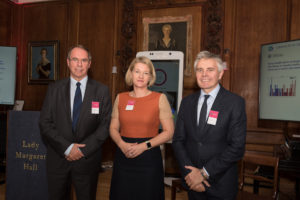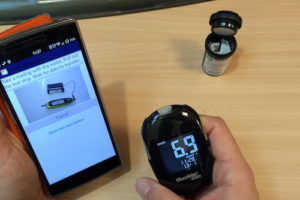
A smartphone application for women with gestational diabetes, developed with support from NIHR Oxford Biomedical Research Centre, has been launched commercially.
GDm-Health has now completed its development following a two-year clinical evaluation in the NHS by over 1,000 women, and is currently available to pregnant women and their midwives at Oxford University Hospitals (OUH) NHS Foundation Trust and Royal Berkshire NHS Foundation Trust.
Three more NHS Trusts – Buckinghamshire NHS Trust, Croydon Health Services NHS Trust and Milton Keynes University Hospital NHS Foundation Trust – will be implementing GDm-Health in the coming weeks.
The app was launched by Sensyne Health, after being developed as part of a collaboration between the healthcare technology company, OUH and the University of Oxford.
GDm-Health is a patient app-to-clinician software system for the management of gestational diabetes mellitus (GDM), which replaces the traditional paper-based method of management.
The system comprises a smartphone application which connects to a wireless blood glucose monitor. The woman’s blood glucose measurements, any text-based commentary she wishes to log and any request for a call back she makes are transmitted directly to a web-based clinical dashboard for the multi-disciplinary team at the hospital supervising her care to manage proactively.
The care team can see near real-time data that has been prioritised through appropriate algorithms and can communicate directly with patients through the system.
GDM is an increasingly prevalent pregnancy-related disease that is driven by demographic and lifestyle changes. In the UK, the rise is predicted to reach over 16%, from a figure of around 4% in 2008.
It is a condition that, without tight blood glucose control, can lead to adverse maternal and foetal outcomes.
The current recommended way of preventing adverse maternal and foetal outcome is to closely monitor blood glucose levels. The most common method of managing diabetes in pregnancy is finger-prick blood glucose testing, with women recording their blood glucose results in paper diaries around six times a day. These are then reviewed regularly by doctors and midwives in clinic. It is a time-consuming process, open to the risk of transcription errors.
 Results published in March 2018 from a randomised controlled trial for GDm-Health demonstrated its value to both women and the NHS. These benefits included: statistically significant improvement in patient satisfaction, adherence to glucose monitoring, a reduction in caesarean sections, a trend towards reduction in pre-term births and potential for cost-savings to the NHS through improved patient outcomes.
Results published in March 2018 from a randomised controlled trial for GDm-Health demonstrated its value to both women and the NHS. These benefits included: statistically significant improvement in patient satisfaction, adherence to glucose monitoring, a reduction in caesarean sections, a trend towards reduction in pre-term births and potential for cost-savings to the NHS through improved patient outcomes.
Batoul Mustafa, who used the app during her pregnancy, commented: “GDm-Health is a great idea and really straightforward to use. It allowed me to better understand and manage my blood glucose levels.
“With the app, everything is in one place and it shares my data with my care team and allows us to communicate through the app outside my appointment times. I felt this technology was enabling me to have more personalised antenatal care.”
Dr Lucy Mackillop, Consultant Obstetric Physician at OUH and Honorary Senior Clinical Lecturer, Nuffield Department of Women’s and Reproductive Health, University of Oxford, is the clinical lead for the development of GDm-Health.
She said: “I am delighted that GDm-Health has made the transition to a commercial product and is available for implementation across the NHS.
“This is as a result of an enormous amount of work by the clinical and academic teams at Oxford University Hospitals NHS Foundation Trust and University of Oxford and by Sensyne Health to have taken our prototype and transformed it into a sustainable scalable product.”
Lord (Paul) Drayson, CEO of Sensyne Health, commented: “The overwhelming positive response to GDm-Health from the NHS and from women with gestational diabetes is testament to its clinically led design and the fact it is technology that is addressing an area of urgent, clinical need. We look forward to its wider adoption in the coming months.”
GDm-Health is one of a number of data-driven health technology applications under development by Sensyne Health in collaboration with the University of Oxford and Oxford University Hospitals NHS Foundation Trust. Anonymised data from these systems, can be made available for analysis by the Company, using its Clinical AI capabilities for the purposes of medical research and to improve patient care.